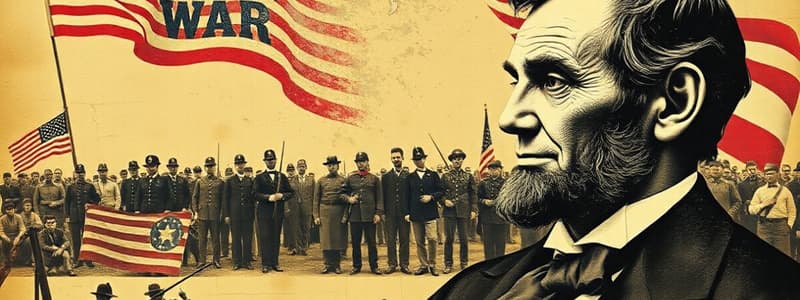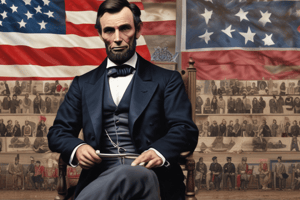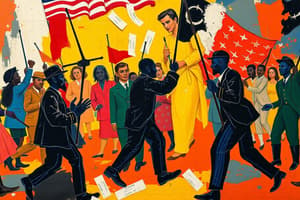Podcast
Questions and Answers
Which of the following were major issues dividing the North and the South during the Civil War?
Which of the following were major issues dividing the North and the South during the Civil War?
- States' rights (correct)
- The status of slavery (correct)
- Economic policies
- Foreign alliances
Abraham Lincoln's primary goal during the Civil War was to end slavery in all states.
Abraham Lincoln's primary goal during the Civil War was to end slavery in all states.
False (B)
What significant order did Abraham Lincoln issue in 1862 that declared slaves free in areas held by the Confederates?
What significant order did Abraham Lincoln issue in 1862 that declared slaves free in areas held by the Confederates?
Emancipation Proclamation
During the Civil War, Lincoln suspended the right of __________, allowing him to arrest individuals without just cause.
During the Civil War, Lincoln suspended the right of __________, allowing him to arrest individuals without just cause.
Match the following amendments with their descriptions:
Match the following amendments with their descriptions:
What was a significant factor stimulating economic growth in the North during the Civil War?
What was a significant factor stimulating economic growth in the North during the Civil War?
The 14th amendment granted citizenship to women in the United States.
The 14th amendment granted citizenship to women in the United States.
What did the 13th amendment accomplish?
What did the 13th amendment accomplish?
The 15th amendment guarantees the right to vote to all male citizens regardless of their ______.
The 15th amendment guarantees the right to vote to all male citizens regardless of their ______.
Match the amendments with their main contributions:
Match the amendments with their main contributions:
Flashcards
13th Amendment
13th Amendment
The 13th Amendment formally ended slavery in the United States, marking a crucial step towards racial equality.
14th Amendment
14th Amendment
The 14th Amendment granted citizenship to African American men and established civil rights for them.
15th Amendment
15th Amendment
The 15th Amendment guaranteed the right to vote to all male citizens, regardless of their race, color, or previous condition of servitude.
Economic Growth During the Civil War
Economic Growth During the Civil War
Signup and view all the flashcards
Succession
Succession
Signup and view all the flashcards
Causes of the US Civil War
Causes of the US Civil War
Signup and view all the flashcards
Lincoln's Expansion of Presidential Powers
Lincoln's Expansion of Presidential Powers
Signup and view all the flashcards
Emancipation Proclamation
Emancipation Proclamation
Signup and view all the flashcards
Impact of the Civil War on Federal Power
Impact of the Civil War on Federal Power
Signup and view all the flashcards
Federalism
Federalism
Signup and view all the flashcards
Study Notes
U.S. Civil War
- Causes of Secession: Southern states seceded due to increasing sectionalism, disagreements over states' rights (particularly regarding slavery), the failure of compromises like the Compromise of 1850 and the Kansas-Nebraska Act, and the election of Abraham Lincoln in 1860. Southerners feared Lincoln's opposition to expanding slavery into new territories would threaten their interests.
Abraham Lincoln
- Preservation of the Union: Lincoln believed that the union was threatened by sectional differences and prioritized preserving it. He viewed the government as a union of people, not states.
- Justification for War: Lincoln argued that his oath required him to defend and preserve the Union.
- Expansion of Presidential Powers: Lincoln expanded wartime presidential powers by suspending habeas corpus, arresting anti-Unionists, increasing the army size without Congressional approval, and arresting newspaper editors. This showcased the potential for rights restrictions during wartime.
- Emancipation Proclamation (1862/63): Lincoln issued the Emancipation Proclamation, declaring slaves free in Confederate-held areas primarily to aid the Union war effort, hoping to keep England from supporting the South.
Reasons for Union Victory
- Economic Superiority: The North had a more developed economy, more resources, and manpower compared to the South.
Results of the Civil War
- Strengthened Federal Power: The war strengthened the federal government's power over the states.
- Amendments 13th, 14th, and 15th: These amendments were crucial in establishing greater federal power and ensuring the rights of newly freed African Americans.
- 13th Amendment: Abolished slavery.
- 14th Amendment: Granted citizenship to African American men and ensured equal protection under the law.
- 15th Amendment: Granted African American men the right to vote.
- Northern Economic Growth: The war spurred rapid economic growth and industrialization in the North, driven by increased government demand for goods and supplies.
Studying That Suits You
Use AI to generate personalized quizzes and flashcards to suit your learning preferences.
Description
Explore the significant causes and events that led to the U.S. Civil War, focusing on the secession of Southern states and Abraham Lincoln's efforts to preserve the Union. Understand Lincoln's expanded presidential powers during this tumultuous period.




